| Parkinson (with Michael Parkinson) Other guests: Harry Connick, Jr, and Al Murray (the Pub Landlord) September 29, 2007 Parky: First up, one of the most sought after actors in Britain. He became that when he played the brooding Darcy in Pride and Prejudice. (audience response) Oh, I know how you feel. I know how you feel. Sexy, but I know how he feels. It was a part which also brought him a dedicated female following, as you heard, His latest film is a moving and powerful account of a father and son relationship. [Shows clip from awards ceremony] Welcome, please, Colin Firth (screams and applause as Colin walks down the stairway) Shall we quit now while we're ahead of the game? Shall we take that and go? Colin: I think that's enough, actually, yeah. Too much. Parky: The film is wonderful. I really did enjoy it. It's a very moving film. I mean, any son relates to his father will associate with it, as will anybody who has loved anybody. Basically it’s about deep love between two people. Colin: Yeah, it is. I mean, I think that the secret of, well, the effect of good writing or any good storytelling is that it makes it feel that it’s about you. I mean, even if it were set in outer space or 18th century France or 12th century Rome, you feel it's telling your story. This is actually not one of those things. This is everybody’s story. I mean everybody’s got a father or a father figure, and everybody is going to lose that person or already has lost that person, and everybody will have a conflict in that relationship. And I think that's what it addresses very honestly. Parky: When you read the book—‘cause it was a book first of all, it's actually a true story, it's an account by Blake Morrison and the relationship he had with his father—were you immediately taken by it? Do you immediately think in filmic terms? Colin: Ah, no, I certainly, was taken by it but I couldn't possibly think of it in filmic terms. It's a very personal, very interior series of impressions written by a man who very recently lost his father, and, you know, that doesn’t cry out to be a film necessarily. He wasn’t intending; it doesn't have that shape. It didn't have that kind of narrative. So it was a book I read quite close to the time it was published and I evangelized it everywhere. I was saying to people, ‘It sounds depressing, this is about a complex love-hate relationship with a dad ending up with a death, but you'll feel better for reading it.’ It's not an easy sell, but the idea of it being a film sort of amazed me actually when they sent me a copy of the script. It took about eight years to develop. Parky: Well it's worked beautifully. I mean, it really does work as a narrative. It really works. And you sympathize and yet are, at the same time, angry at times with both characters, both the principal characters. The father is very charismatic. He's a doctor. Colin: Well, yes, he is. And I think that his charisma is partly what is the thorn in the side of his son because, while his father is being delightful and he's charming the room, the very self-conscious and hypersensitive 17-year-old’s toes are curling, saying “You don't understand. He's not a charming, lovely man. He's a complete bastard and he's humiliating me.” And what you just saw there in that clip is the sad fact that, when you reach your mid-40s, that figure has a capacity to transport you back to being seventeen again. [agreement by Parky] You think you've achieved something—there he is getting an award, he's moved on in life, he's proved himself, he's a father himself—and everything’s in place until you walk through the door of your family home and then some tone of voice transports you right back to being seventeen again. Parky: You play opposite the wonderful Jim Broadbent, who plays your father. We’re going to see a scene now. ‘Cause what it’s about, it’s about communication. It’s about lack of communication basically as well. This scene, we see, it’s a bit about your dad on his deathbed—the character who plays your dad on his deathbed—and you there, trying to come to terms with it and him. So, let’s have a look at this. [Clip, followed by applause and a rather uncomfortable-looking Colin] Parky: Again, there is something moving, something very British too about that reserve, that barrier, that feeling that, even at that moment in time when you might not have the chance to do it at all ever, you pull back. Colin: Yeah, I think one of the reasons why the film resonates with so many people is that you don't say the right things at the right time. I think every loss is accompanied by a series of regrets, you know. The film is very frank about that, the fact that you don’t have the big speech that you've always intended to make, you don’t resolve all those things, the last words don’t come at the right time. And in fact in the end death is the most natural thing that you can possibly imagine. It will happen and it’s very practical. He's sorting out bills because he's off somewhere, and that's how it works. You know, I think in some ways he's more in tune with the practicalities than the son, who's got so many unresolved things. It reminds me a bit of something in my own life. I still have my parents—and they’re both well—but I, very recently, relatively recently, seven years ago, saw my father lose his son [sic]. So I saw my father as a son, in the role of a son losing his father, and, you know, he was quite a reserved Yorkshireman, as well. Parky: Did it actually affect your own relationship at all with your dad—it’s a silly question—but did it make you reconsider your relationship? Colin: These things don't necessarily happen in one blinding light, but it did, I think. It’s percolated through my life in the year since the film, and it’s made me reflect on myself as a father as well. Parky: You’ve had a strange sort of upbringing, didn’t you? You were traveling around the world quite a bit. Your mum and dad were teachers. You spent some time in Africa. Do you have any recollection of that place? It seems that, in young people, it seems to leave them with images. Colin: Yes, I have images. It’s very hard to know what qualifies as a real recollection because, you know, it has to survive the ravages of reinvention and wishful thinking and editing as time goes on. One of the most vivid memories I have—which I don’t know if it would withstand interrogation—is the boy next door, who was an African boy. We were both about two years old and I remember having very involved conversations with him, and I think I'd learned the words for tractor and poo by that age in my own language and he didn't speak a word of English or probably his own language. And my memory has it that we were discussing the effects of Nigerian independence on the Yoruba people, you know. [laughter] My mother says we were babbling at each other. So, I remember smells. I remember images of light and my father driving to work and the pets we had. It does come back. Parky: What comes across when one reads about that background is the sense of you being the outsider, of standing outside the society that you're in because you are that and you are detached from it. You moved around all the time. Will you agree with that description to start with? Colin: Yes Parky: And would you say that’s a good position to be as an actor? Colin: Yes, I probably found it difficult as a school boy once or twice, but I’ve never regretted feeling slightly outside things. I think, I know that I am very much of this country, and I think paradoxically I'm considered to be a consummate representative of a certain type of Englishman, which I don’t feel myself to be. And so I think you see everything with two pairs of eyes really if you've moved about a lot. You see things from an indigenous point of view and you see things from a visitor’s point of view. Parky: What about acting? There’s none of that in your family. I mean where did that come from? Colin: I don’t know. That’s question that’s was besieging my parents since I left school and went about this business. Where could it possibly have come from? I think we’re very confused people, actors. I think that’s the first prerequisite. I think you have to be very confused. Parky: About what? Colin: Everything. Yeah. You have to have a bit of an identity crisis going on. That has to last for quite a long time. You have to cultivate that, you know. And then you also have to have an incredible desire for attention. So you have to be a confused person who wants attention. [laughter] And then you have to have some desire to try on different identities in some way. I mean that’s actually quite a strange cocktail. And if you’re not going to be an actor, you probably need help. [lots of laughter] Parky: So it’s cheaper than psychiatry. Colin: Absolutely. They would pay me. It was an alternative to hospitalization, I remember. Parky: There you are. [major incomprehensible mumbling] Getting lots of work and doing all sorts of stuff and then along came Pride and Prejudice and that just changed everything, didn’t it? Colin: Yes, I suppose it did. [laughter] I didn’t see it immediately. I mean, I was away at the time. I’d just met the woman who is now my wife and I was in Italy, and we were all blissfully unaware of what was going on for awhile. And I kept getting some bulletins from England while it was running, saying, giving me some idea of what was happening and I.... Well, the first person who told me was my mother. She said, telling me that I was getting lots of attention back home. “Bless you, mother. Yes, of course.” And then by way of proof, somebody sent me some articles, recordings of radio programs about it. And I remember going into my Italian, prospective, future family of in-laws and saying, “I have an announcement to make. I’m a heartthrob.” [laughter] And when the laughter died down, there was a period of kind of bewilderment, of real, genuine searching about how this could be possible. The fellow was kind of gazing at me. “The English, the English. What is it with the English? [scratching forehead, showing bewilderment] We’d finally seen tapes by this point. We had seen the first three episodes. And they looked at it and said, “Well, this is fascinating. So the English find this sexy. You like repression? Do they? So do you find John Major sexy? Prince Phillip? Is he?” Because I was talking to people, who...I remember there was Joaquin Cortés had come to town. You know, flamenco! That was what they called sexy. So, they’re seeing this kind of lamppost walking around was very, very confusing. Parky: So you are surprised by it all? Colin: Yes, but it was a slow burn really. I mean, because I didn’t process it immediately, it unfolded as a series of surprises which have lasted until today Parky: It was supposed to be done in the nude, wasn’t it, originally? Colin: Thaaaat scene, yeah. Parky: The famous scene. The famous scene. Colin: It was supposed to be done in the nude. I thnk it was a blessing for me and really for everybody else that we found an alternate. Parky: Would you have done it in the nude? Colin: Oh [drawing it out and looking adorably thoughtful], probably. [clapping and wolf whistles] There wouldn’t be this applause if you’d seen it. Parky: Which begs the question: would you’d been a bigger or lesser heartthrob had you done it? Colin: Than? Parky: Than, if you’d bigger heartthrob than... Colin: Keep it under wraps is always good. Parky: I know this comes up in...I suppose you regard it as kind of a, what, something you have to talk about and think about, but it did affect your career, didn’t it? In a sense, it lifted you to a different degree of recognition. Colin: Yes, it certainly must have done. It’s hard to evaluate how that happened or to measure because you can’t go through your life measuring the effects of one incident, you know, twelve years ago or considering what might have happened had that not happened. So I really don’t know. I mean, I thought I was doing really well until that happened. And then when it happened, I was, you know, it was as if I’d been nowhere up to that point. So I don’t know. Now, it’s something, it’s like a secondary, it’s a name, like one of those school nicknames you can’t shake off. Parky: I read that you’d thought of changing your name. Colin: Oh, just recently? Well, I did. I thought perhaps if you’re going to be called Mr Darcy all the time I might as well just change my name to Mr Darcy. (laughter) And then people can finally say, “No, you’re not Mr Darcy,” which would be a first. (laughter) Parky: Now, this film of yours comes out... Colin: Next week Parky: And, as I said, I really enjoyed it. It’s a very, very powerful film, and I hope it will do very well. But you’ve got so many other things lined up, haven’t you? You’ve done this St Trinian’s movie? Colin: Yes. Parky: And you’re just back from Greece, where you’ve done Mamma Mia!? Colin: Yes (with sly smile). Parky: You sing in Mamma Mia!? Colin: Yes (with dubious look on face, accompanied by lots of audience laughter). Singing’s a big word. It covers a multitude of sins. I’m entrusted with a song, which mercifully is not the family silver. It’s an album track which was never a single. It’s called ‘Our Last Summer’ and so I’m not on sacred ground in the way someone had given me ‘Dancing Queen,’ which part of me would loved to have done. (laughter) But it’s been a very odd year from that point of view because the farcical territory of St Trinian’s, where I’m being humped by a small dog called Mr Darcy (laughter), culminating in a wild love scene with a transvestite Rupert Everett. Parky: Your favorite man? Colin: Indeed. And then straight into Spandex and Lycra Parky: And a great cast that they chose. Colin: Yes, Meryl Streep, Pierce Brosnan, Stellan Skarsgård. Parky: Lovely. Well, all the best with When Did You Last See Your Father? I said I enjoyed it immensely, and I’m sure the public will also. Colin Firth, thank you very much indeed. Colin: Thank you. [They reach over and shake hands Then Colin sits back and smiles broadly.] Gallery of screen captures to be linked here |
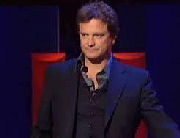 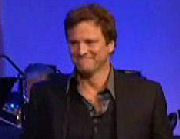 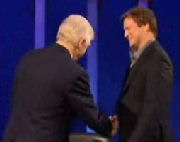 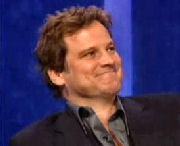 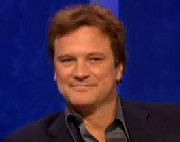 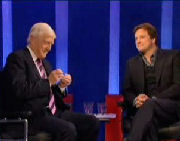 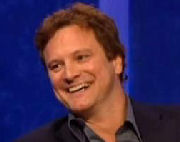 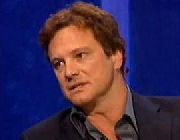 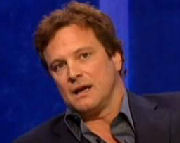 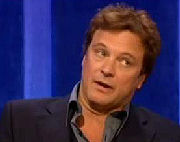 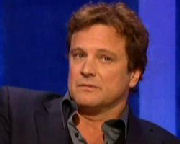 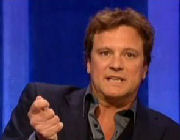 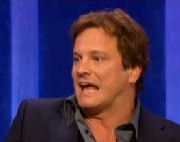 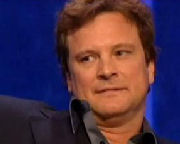 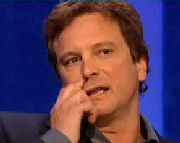 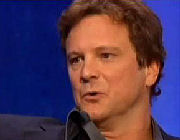 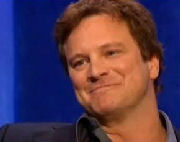 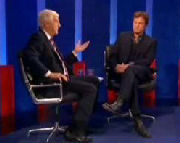 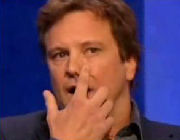 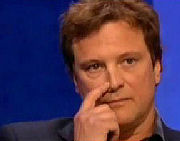 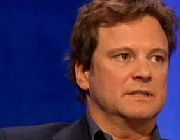 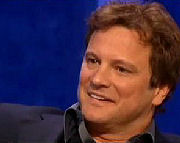 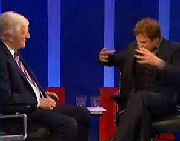 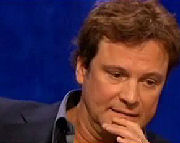 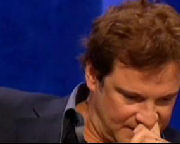 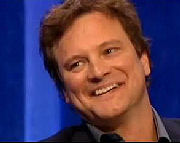 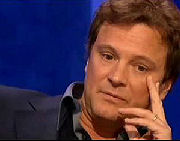 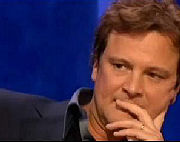 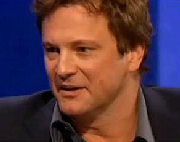 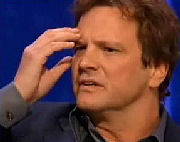 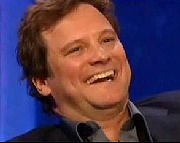 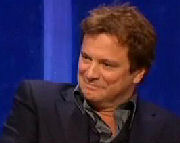 |